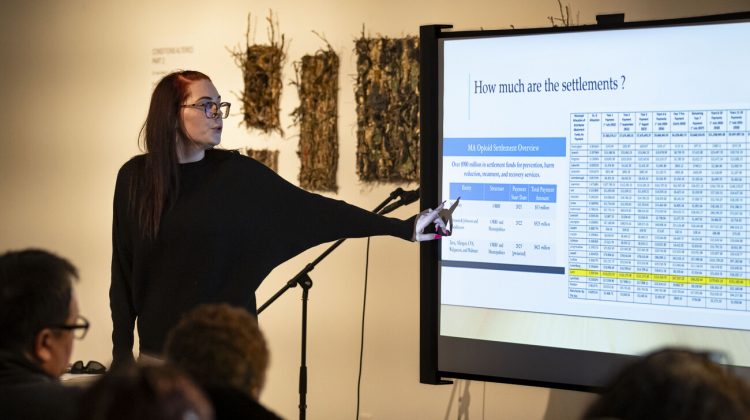LYNN — In an effort to help disperse municipal abatement funds recovered from Massachusetts opioid settlements, Lynn’s Opioid Working Group held a public forum this week to take stock in itself and figure out what it needs to do to stay relevant.
The forum was held Wednesday at the Lynn Museum/Lynn Arts and consisted of discussion pertaining to why the group was created, what the group is currently doing, how the public can get involved, and what should be done with the abatement funds.
The Opioid Working Group was formed to make recommendations to the city on how to allocate the funds. The Group is composed of community members who have lived in or have working experience with harm reduction, mental health, and substance abuse disorders, city council members, public health employees, police, fire, and a representative from the mayor’s office.
Currently, the group is looking to add more citizens who wish to volunteer.
Candice McClory, Opioid Program Specialist for the Public Health Department, led the forum, letting the attendees know the importance of the funds.
“These funds can be used to repair decades of damage caused not just from opioids, but from the many other substances that have ravished our community,” McClory said.
Discussing the background of the funds, McClory said that Massachusetts had participated in a nationwide federal lawsuit against pharmaceutical companies, receiving combined settlements over $900 million. The settlements are to be used for substance use prevention, harm reduction, treatment, and recovery support.
“A couple of the key findings that were in this settlement were that opioid manufacturers used unfair and perceptive sales tactics to aggressively promote prescription opioids,” McClory said. “The misconduct enabled and perpetuated mass increases in opioid overuse and diversion and multiplied the total of substance abuse disorder, along with overdose and death at the commonwealth, and residents continue to suffer everyday.”
After dividing up the settlements across the state, Lynn will receive $2,693,959.09 over approximately 11-18 years.
These funds come with stipulations such as having to use the money for substance abuse issues, opioid use disorder treatment, support for people in recovery, connections to care, address the needs of criminal justice people involved, support for pregnant and parenting people with opioid use disorder, and prevention education.
Lt. Stacy Borjeson, group member and Emergency Medical Services Coordinator for the Lynn Fire Department, discussed priorities.
“In 2021, (Lynn) had 60 deaths from opiate overdoses,” she said. “It went up to 63 in 2022, for an overall increase of 3.28%.”
Borjeson said that the number increased more rapidly in minority communities.
To combat this, the group has already created the Harm Reduction and Community Wellness Mission Initiative, expanding low-barrier access to Naloxone, Narcan, and harm reduction supplies in the form of five community boxes.
“They’re free guys. So they have Narcan in there, they have barrier face shields for you to do mouth-to-mouth, there’s information on where people can go to get treatment, seek treatment, and there’s also federal test strips in there,” Borjeson said.
She said there have been no signs of vandalism of the boxes so far, and they have already refurbished the boxes over 100 times.
McClory said the group initially conducted a survey at an event held, asking citizens what they think should be done with the funds. With 26 respondents, the survey showed requests for more supportive services, housing, nutritional information, community clean-up, transportation, mental health, clothing, skills opportunities, and recreation.
Now, the group has created an online survey in seven different languages, where citizens can voice their wants and needs.
“This is where we could use the community input. We really need the community input,” Borjeson said.
She said the first round of data analysis from the survey will be conducted May 31.
Along with the survey, the group is currently working on finding ways to retain volunteer community members, releasing available funding, and assigning a program manager to maintain initiatives.
“So one of our initiatives that we’d like to do is release small grants to businesses and nonprofits that work for the substance use community,” McClory said.
The rest of the forum was opened up to questions and opinions from attendees. More information on the funds, the group, and access to the survey can be found on the City of Lynn website.

